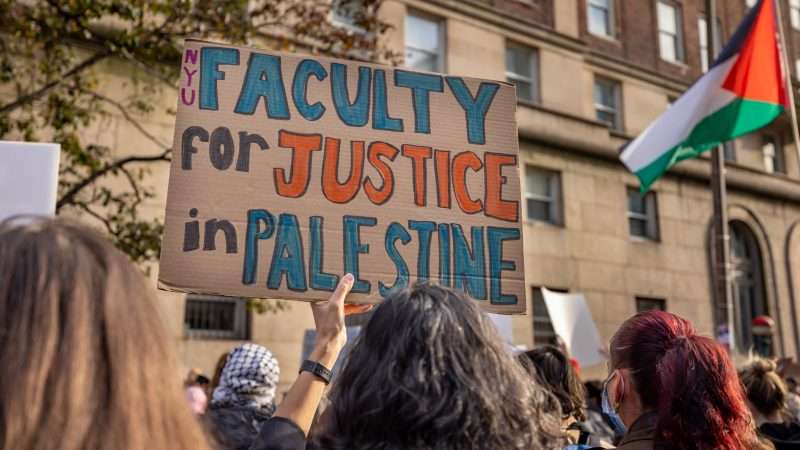
Since the start of the Israel-Hamas war, college campuses around the country have been embroiled in intense anti-Israel protests. Elite college campuses have seen particularly aggressive demonstrations that have frequently included outright support for Hamas.
On December 5th, the college presidents of Harvard, the University of Pennsylvania, and the Massachusetts Institute of Technology (MIT) appeared at a Congressional hearing, where they were grilled on their schools' response to allegations of campus anti-Semitism. During the hearing, Rep. Elise Stefanik (R-NY), asked all three if "calling for the genocide of Jews" would violate their school's policies.
"It is a context-dependent situation," University of Pennsylvania President Liz Magill responded. "If the speech becomes conduct, it can be harassment,"
Outrage over Magill's answer—both from those who wished to see her commit to banning legal but offensive anti-Semitic speech and from those who pointed out Penn's consistent record of punishing professors for much less offensive expression—culminated in her resignation on Saturday.
While First Amendment advocates have expressed hope that these recent controversies would show just how easily abused anti "hate speech" rules on college campuses are, many administrators seem to be taking the opposite position, advocating for more censorship, not less.
On Sunday, Claire O. Finkelstein, who is a member of Penn's Open Expression Committee and chairs the law school's committee on academic freedom, took to the pages of The Washington Post in an article titled "To fight antisemitism on campuses, we must restrict speech."
In it, Finkelstein farcically argued that "the value of free speech has been elevated to a near-sacred level on university campuses," adding that, "as a result, universities have had to tolerate hate speech."
The idea that free speech is treated as "near-sacred" on college campuses is beyond absurd. Far from being treated as sacrosanct, free speech and free expression are constantly under fire at American college campuses, elite colleges most of all.
As the Foundation for Individual Rights and Expression (FIRE) CEO Greg Lukianoff points out, over the past decade, "we know of more than 1,000 campaigns to get professors punished for their free speech or academic freedom. Of those, about two-thirds succeeded in getting the professor punished."
The most disturbing detail? Lukianoff says that almost 200 of these professors were fired, "nearly twice the number estimated for the Red Scare."
Finkelstein further argues that colleges—both public and private—should crack down on anti-semitic speech from students by employing an incredibly broad definition of conduct like incitement or harassment.
"With or without the First Amendment, calls for genocide against Jews—or even proxies for such sentiments, such as calling for intifada against Jews or the elimination of Israel by chanting "from the river to the sea"—are, in the present context, calls for violence against a discrete ethnic or religious group," she writes. "Such speech arguably incites violence, frequently inspires harassment of Jewish students and, without question, creates a hostile environment that can impair the equal educational opportunities of Jewish students."
While much of the content of college anti-Israel protests in recent weeks has included genuinely anti-Semitic speech, the First Amendment simply protects the vast majority of even deeply offensive speech. Further, legal terms like "incitement" and "harassment" have incredibly narrow definitions that almost certainly do not include speech like chants of "from the river to the sea" during anti-Israel protests.
While Penn, as a private university, is not bound to follow the First Amendment, Finkelstein also makes a non-legal argument for increased censorship.
"What values do university presidents think are most important to prepare leaders in a democracy?" Finkelstein writes. "The ability to shout intemperate slogans or the ability to engage in reasoned dialogue with people who have moral and political differences?"
However, Finkelstien's mistake is nearly universal amongst censorship advocates. While silencing the most heinous instances of anti-semitic speech may sound acceptable at first glance, there's no guarantee that introducing wide-ranging speech codes wouldn't be wielded against speech Finkelstein likes, not to mention a wide range of controversial political speech.
Finkelstein concludes her essay by asking, "Isn't it time for university presidents to rethink the role that open expression and academic freedom play in the educational mission of their institutions?"
Here, Finkelstein is right. They should—but in order to recommit to free expression, not censorship.
The post <i>Washington Post</i> Op-Ed Argues That Colleges Should 'Restrict' Speech To Fight Antisemitism appeared first on Reason.com.







